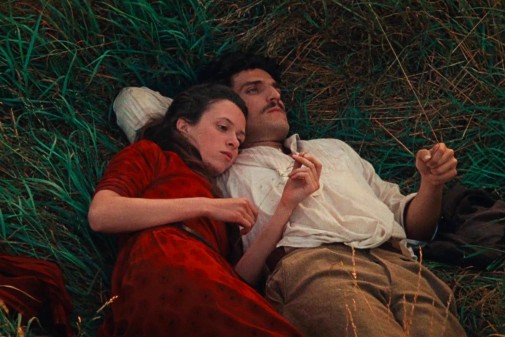Review: Pietro Marcello's "Scarlet" is a picture out of time
 Sunday, June 11, 2023 at 6:00PM
Sunday, June 11, 2023 at 6:00PM 
Whether documentary or fiction, Pietro Marcello's films always convey the quality of artworks lost somewhere between modernity and an undefined past. 2019's much-lauded Martin Eden took this aspect to its peak, evoking the palpable authenticity of Neorealist cinema while playing fast and loose with history in its design. That film's relationship with the past circumvents reactionary nostalgia. The anachronistic scenography suggests an atemporal milieu, breaching the porous membrane separating the narrative's period and the viewer's sense of now. This further underlined the piece's political gestures, turning retrospective into a direct address. In comparison, Scarlet represents a more conventional object though it shares many qualities with its predecessor.
Like Martin Eden, Scarlet is a literary adaptation looking back to Europe in the first half of the 20th century. The raw material is Alexander Grin's 1923 novella Scarlet Sails, once brought to the big screen by Soviet filmmaker Alexandr Ptushko. In Marcello's film, the Russian setting is transposed to rural Normandy…

The story starts as World War I ends, archival footage anchoring Scarlet in the reality of a continent reconstructing itself, bloody scars torn over the land as far as the eye can see. One of the men returning home is Raphaël, though he has no home waiting for him. Instead, we follow the soldier as he searches for a wife left behind, one of many whose lives irrevocably changed in the conflict's arduous years. Sadly, she's gone, her memory kept alive by a penniless landowner who's been caring for Juliette, the dearly departed woman's daughter with Raphaël.
Having decided to raise her, Raphaël stays in the village. A skilled woodworker, he tries to find a job in the local shipyard but conflicts with one of the community's leaders prove to be his downfall. And yet, the promise of the young century remains bright. Talents redirected to the carving of toys, Raphaël shall travel periodically to the nearest city, often bringing along little Juliette, who, like her father, is always regarded as an outsider. Life goes on, the 1910s bleed into the 20s, the 30s, and the world changes.
Beyond Juliette's aging - switching actresses as she grows - there's little indication of the passage of time in the picture's design elements. Brief glimpses of city life suggest changing fashions, but the character's pastoral existence is stagnant, as if everything has remained the same since the end of the 19th century. There's a visceral understanding of class distinctions in these contrasting sights, but one also finds that the absence of modernity allows for the perseverance of superstition. The townsfolk believe in witches, and the film noncommittally agrees with them.

Veiling Juliette's pariah status in mysticism, Scarlet never outright capitulates to fairytale logic. Instead, it teases. Not that Marcello is fundamentally against such transformations, constructing his film according to a tenet of all-powerful imagination, where the artisan's creation is not so different from the storyteller's fantasy-making. Consider a repaired piano that serves to illuminate more of Raphaël's past while giving Juliette the gift of music – incorporated beautifully into Gabriel Yared's score. Her singing sometimes forces the film into intermittent musical. On another level, predictions from forest-bound crones lurking by the river prove prophetic, further diluting the hold of strict realism over our story.
They provide another opportunity for mutation. This time, not a musical birthed from childish sing-a-long but romantic reverie ready to fly into the horizon. Keeping the possibility of change alive in a world of apparent stasis becomes the primary ethos moving Scarlet forward, working within a register entirely disconnected from character psychology, attuned instead to the general vagaries of history. It's the simplicity of a fable, allied to the modernist edge of a filmmaker keen on combining tradition with innovation. This is most apparent in the cinematography.

Marcello and his new DP Marco Graziaplena harken back to the celluloid glory of Martin Eden, though the subject is much more bucolic with a painterly twist to its color story. In Scarlet, the air is smoky blue, the sun's warmth trespassing the screen into the theater, red manifest in brilliant ruby that seems to blaze like passion unbound. Peering at the film, the projected image is a window into cinematic dreams, so gorgeous you feel your heart lift. But of course, this mind-bending prettiness needs to be counterbalanced by the roughness of country life and the realities of living virtually destitute, the pains of labor acknowledged in tandem with its nobility.
In this instance, the Neorealist instinct tempers the magic, paradoxically heightening its power. The actor's faces are straight out of Pasolini making for a tapestry of humanity whose flesh feels untouched by our age. A proletariat spirit capable of heartbreaking gentleness, the thinly-written but exquisitely performed Raphaël thus personifies the conceptual backbone of Scarlet. Juliette, on the other hand, floats over the lived-in milieu. She takes our hand, carrying film and audience alike into a gossamer romance that holds alive the promise of a brighter future. Even in harshness, hope flourishes, art lives on, and tomorrow shall arrive flying overhead, slashing the sky scarlet.

Scarlet is currently enjoying a limited theatrical release stateside. Don't miss the chance to bask in its beauty.



Reader Comments (1)
Oh, I'd like to see this!